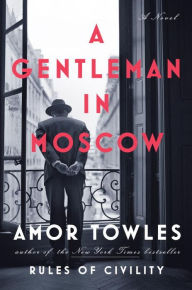
Reading A Gentleman in Moscow reinforced a lesson for me about paying too much attention to blurbs, brief reviews, and general comments about books. I went into this book believing I was in for a political thriller, full perhaps of espionage, political theory, and intrigue. And I’m delighted to say that it was nothing like that (although it did have wonderful intrigue).
The story opens in 1922—shortly after the Bolshevik revolution in Russia. The main character, Count Alexander Rostov, is detested by the new communist apparatchiks, but because of a beloved and important poem Rostov has written, they don’t feel they can easily get away with executing him, as they wish to do to all the throwbacks to Russia’s aristocratic days. So instead they declare him a Former Person and exile him to house arrest in the Hotel Metropol, just around the corner in Moscow from Red Square and the Kremlin.
The book is the story of the next three decades Rostov spends in the Metropol. It traces the relationships he builds, the skirmishes with authority he enjoys, and the many ways he finds to occupy all those years. And it’s a wonderful journey.
It’s a delightful novel, chiefly because of the author’s tone, the main character’s charm, and the kindness of so many of the people in Rostov’s life at the Metropol. One just feels good reading it. So while it’s not a spy thriller, it is nevertheless a delight. I found myself smiling on countless occasions as Rostov outsmarted and outmaneuvered all those in his way. And while I haven’t yet read Towles's first novel, Rules of Civility, I am certainly now looking forward to it.
The story opens in 1922—shortly after the Bolshevik revolution in Russia. The main character, Count Alexander Rostov, is detested by the new communist apparatchiks, but because of a beloved and important poem Rostov has written, they don’t feel they can easily get away with executing him, as they wish to do to all the throwbacks to Russia’s aristocratic days. So instead they declare him a Former Person and exile him to house arrest in the Hotel Metropol, just around the corner in Moscow from Red Square and the Kremlin.
The book is the story of the next three decades Rostov spends in the Metropol. It traces the relationships he builds, the skirmishes with authority he enjoys, and the many ways he finds to occupy all those years. And it’s a wonderful journey.
It’s a delightful novel, chiefly because of the author’s tone, the main character’s charm, and the kindness of so many of the people in Rostov’s life at the Metropol. One just feels good reading it. So while it’s not a spy thriller, it is nevertheless a delight. I found myself smiling on countless occasions as Rostov outsmarted and outmaneuvered all those in his way. And while I haven’t yet read Towles's first novel, Rules of Civility, I am certainly now looking forward to it.
 RSS Feed
RSS Feed
